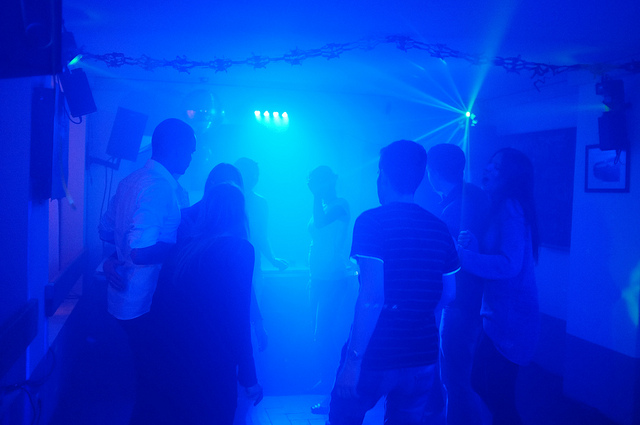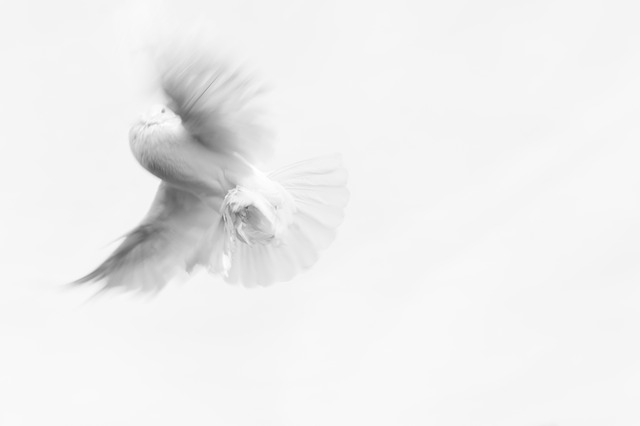Sara Lippmann
We go to Eric Frank’s house after school. Eric’s mom lives behind the high school parking lot and she has an open door policy. The basement latch is left unhinged—it’s like a troll door—or else, the key is kept under a rock, honor system.
By now, the honor has spread to include seniors who’ve walked off sports teams, a handful of sophomore girls. Whoever has last period free stops at the gas station for chips and sours and Mountain Dew. Sometimes there’s a pizza among the empty boxes. We’ll pick at the hardened strings of cheese, chew a disc of pepperoni. We are always hungry but also not. Eating is something to do, like holding a joystick or blunt or dick; without purpose, it is easy to get sucked in. Occasionally, a quarter keg clunks down the stairs.
I can’t remember why I started coming. I don’t play sports or chess or jazz band. I don’t play anything so I have nothing to quit. I’ve known Eric since preschool, when his mother used to raft six of us together with a single seatbelt for carpool. Back then, his hair was the color of Tang and cut in a bowl, poker straight. Like the wind could knock all the seedpods off the gum tree and his hair would still swing to its rightful place. My locker is next to Eric’s, our names alphabetical; our parents had been friendly until his split, his dad donning an ascot and moving downtown, his mother going back to school—“to find herself,” she said, when my mom and I ran into her in the grocery. Her eyes watered up as she said it and I felt bad, like someone should tell her she was barking up the wrong tree. When has anyone ever found anything at school? Custody was a mess, she said, but Eric’s sudden popularity, spurred by his independent—slash—newly unsupervised home situation, filled her with pride. “High school has been good for Eric. He has all these friends.” By contrast, things have been harder for her, although not as hard as they are for Mr. Frank. If our town resists change, it resists people like Mr. Frank, who loves how he loves, even more.
Already the basement is half-full. Upperclassmen have claimed the couch, a clutch of girls in stiff hair and leather sprawl over the Lazy Boy like kittens. Amy’s there but she’s not talking to me. Billy’s there, too, but I’m used to it. In a few hours, when we get bored enough or stoned enough or restless enough we’ll reach for whomever, elbows at side boob, thighs mashed but limbs loose, limbs like earthworms before dissection. I’ve just come from Bio. Mr. Keller trails me with his garbage can as I clean up the labs. Earthworms are skin breathers. They are male and female. He smells like formaldehyde. Earthworms are also blind. I remove the pins from wax boards and deposit their bodies, wrinkled and cold, like used-up voodoo, like string beans left on a dinner plate.
“Have you seen Eric?” I say.
People look up, nod. I have earned nodding status. They either know or don’t know.
“Sorry,” they say.
It’s not that Eric is ugly so much as shapeless, out of shape, I could lap him in phys. Ed. if I wanted but that’s not my kind of want. He has a terrible case of bong acne, red and blotchy around his jaw. No one makes out with him, and he’s resigned to it, to not being kissable. Sometimes, he’ll get a hand job.
The girls are new. I don’t know them. I’m not even sure we go to school together, if they go to the other high school, if they’re still in junior high. Without saying anything they accordion up to make room, but I don’t feel like sitting.
“Everything cool?” Billy runs his tongue along the rim of a rolling paper. From here, I can smell the resin off his fingers, the tacky grit beneath his nails. I can feel his eyes beneath his hair. He and the other guys are hunched over the coffee table, sorting the seeds onto a tits magazine. The cover model has a scratched-in mustache. Ink blots of milk dripping from her. The guys MacGyver bongs from plastic liters and pen casings and aluminum foil. It’s not that we don’t have paraphernalia. It’s who wants to pull a pipe when you can smoke a potato instead?
“Let’s go,” Amy says, meaning Billy, the laundry room. The laundry room is where people go. The machines are puke yellow and the floor is poured concrete, damp as clay, but the sweet floral of fabric softener warms me up whenever I’m in there. It’s a comfort. Like that stuffed bear buried in a basket, giggling even when lost and forgotten, because in commercials everything ends up just fine.
Once Eric hoisted me up on the dryer and turned it on. We were barely messing around but I could tell from the way he lifted me by the hips with that ringworm grin, that clown mouth, that he thought he’d given me a big gift. Here he was, expecting something. The machine shook beneath my thighs like it was ready for take off.
“Well?”
“Nope,” I told him. Apparently, I was going nowhere. No windup in my toy. I felt nothing. Numb, but also high. I swung my legs. My knee poked through a hole in my jeans. “Damaged goods. Return me to the store.”
“Never.” He stuck out his hand but I didn’t take it. I didn’t need help hopping down.
When Billy said, “I’d shelve you,” it was different. His voice, low and sexy. Like I was a trophy, maybe, but also, get it? On account of my size. He’d never met an object he wouldn’t prop. Clever, Billy. I could be a collector’s item. I could collect dust. I could be animated at will. Had I seen the size of his shelf? Did I want to? I did.
The problem is, Amy believes in possession.
People need to believe things. In our town people believe in promises the way they believe in safety and belonging. There are clubs for everything—you’re either out or in. How’s it? “You had to be there,” they say, or simply: “Location.” Nod, finger snap. “I’ve got you covered.” With Billy I was uncovered, shirt off, my excuse for a bra bunched up like fishing line, too light for bait, too small to catch hold, thin enough to snap in his grip.
“In a minute,” Billy says, without looking at Amy. He peels a cigarette and refills it with shake. Again, he’s licking. You sure?
The clock on the basement wall is busted. Eric’s parents got it with the proofs of purchase from their twelve packs they used to drink. It’s funny, now, to think about them as a family. They also drank domestic, watched fireworks on the Fourth of July in lawn chairs, drove down the Shore, bicycles obstructing the view.
When the bowl comes around I take it. I smoke and pass, careful not to pull twice. I am no needy greedy. I toss out my bag, tight and sweaty from my front pocket, like a bonus boner. It’s an unspoken rule: we pool our weed. What we lack in quality we make up for in quantity. Some may have cars, but we are socialists with dope. In phys. Ed, we line up like human dominos. This is the game: Close eyes. Ready position, arms out. At the whistle, let go. On three: catch.
No one mentions today’s crash. As if we hadn’t heard the loudspeaker. Distant sirens. Our principal’s report. The senator, a ketchup tycoon. Children in the field. We are good at making every day seem like every other day. On the TV screen Nintendo beeps and pings. CDs click over: Yes becomes Nirvana. The phone rings and rings but no one answers. It’s not our house. Dried tape dots the wood paneling like Tetris. Bald scraps where a poster once was, a corvette or Julius Irving, the painted members of Kiss. The basement has no windows, so after a while it’s hard to know how long we’ve been here. Typical basement. It smells like a sleeping bag left out in the rain. It also smells of dirty socks even though we keep our shoes on. A Jewish thing, Eric says. Shoes only come off when you’re mourning the dead.
When Eric finally arrives, his eyes are glazed over, lids puffy and red, like he’s been crying—or he’s mega fried. He punks to the floor, props himself against a sofa leg. His tied flannel fans out from his waist like a skirt.
He says, “What did I miss?”
We’re onto apple cores now. I pass then slide down next to him. He is shaking some but it had been an empty worry, he says. His little sister is fine. In the day’s confusion everyone forgot she’d been at his dad’s in the city the whole time. Strep throat, home from school, cartoons on the couch, but— He exhales a cloud of smoke. Coughs. “Still, I can’t stop imagining how it might’ve been different.” After school, Eric had tried to get close to the scene, but the entire elementary was cordoned off. Fuselage, burning, a lone wheel. It’d been recess when the aircrafts collided and fell in fire from the sky. Fifty, maybe sixty children out playing. Awful, and yet, Eric says, it could have been worse. Half the school was still inside watching from classroom windows. Pigtails, eyeglasses, monkey bars. Bodies melting like beautiful metals to be reformed, hardened into totems, made impossibly durable, meant to last.
“One kid said, it looked like the war coming home,” Eric says, tearing now, almost choking. He passes the core. And so on. Billy and Amy blow smoke into each other’s mouths. I don’t care. I cradle his head. Eric’s hair is no longer straight nor red but thick and swirly and unwashed and I pat it like an animal in from the cold. He shivers. I think about kissing, hard. I bring his face to my lap. “Hey,” I say. “But it wasn’t.”
Sara Lippmann’s debut collection, Doll Palace (Dock Street Press) was long-listed for the 2015 Frank O’Connor International Short Story Award. She was the recipient of an artist’s fellowship in fiction from NYFA (New York Foundation for the Arts) and her work has appeared in Slice Magazine, Tupelo Quarterly, Front Porch, Midnight Breakfast, Wigleaf and elsewhere. She teaches with Ditmas Writing Workshops. For more, see saralippmann.com or follow her on Twitter at @saralippmann.



